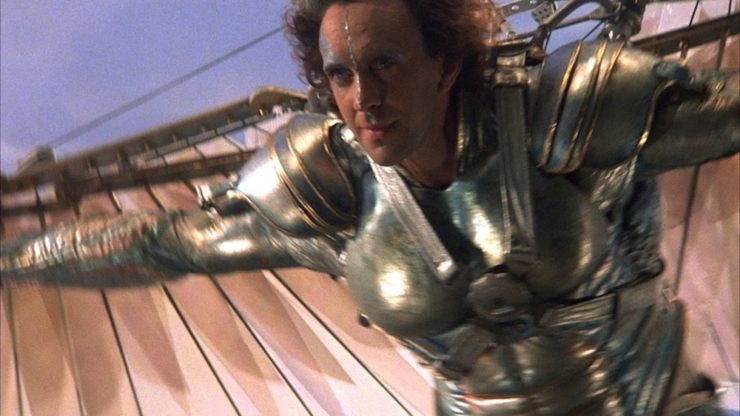At the risk of being branded a heretic, let me say that I am not completely unsympathetic to Sid Sheinberg.
(And at the risk of being pilloried by those who still haven’t seen Terry Gilliam’s masterpiece, Brazil, in the thirty-plus years since its release, let me alert you that there will be copious spoilers about the film from here on out.)
Gilliam’s battles with Sheinberg over the U.S. release of Brazil are nearly as well-known as the film itself. Sheinberg, then the president of MCA—the parent company of Brazil’s American backer Universal—was not shy about expressing his displeasure with the movie’s running time and, especially, with its dire, mind-fake ending. It took the Los Angeles Film Critics Association declaring the film the best of 1985, plus Gilliam’s ballsy move of taking out a shaming ad in Variety, to get the exec to throw in the towel, scuttle a made-for-television re-edit that has since been sarcastically dubbed the “Love Conquers All” cut, and give Gilliam’s vision its much-deserved—and justly celebrated—theatrical release.
But I can see where Sheinberg was coming from. And his objections are exactly the reasons why the Gilliam version was the one that had to be released.
In a dystopic, fascistic Great Britain (think V for Vendetta, but simultaneously grimmer and more absurd), a skilled but unambitious bureaucrat, Sam Lowry (Jonathan Pryce) has his world turned upside down when he lays eyes on Jill (Kim Greist), a commercial trucker who’s struggling to find out why a neighbor has been arrested and remanded to the Ministry of Information for what’s euphemistically called “information retrieval” (read: “torture”). Laboring under the mistaken assumption that Jill is one of the terrorists involved in a decade-plus string of bombings, and awash in fantasies of becoming the woman’s savior, Sam struggles to insinuate himself into Jill’s life, only to place them both at greater risk of arrest.
Terry Gilliam—co-scripting with playwright Tom Stoppard and frequent collaborator Charles McKeown—follows a path he had established with the high fantasy deconstruction Jabberwocky and the putative kids film Time Bandits: Positing an ominous scenario and then distilling pure—if unsettling—farce from it. In this nightmare world, the government manages to maintain its iron grip on the people as much through incompetence as brutality—bureaucrats keep their heads down and convince themselves that as long as they’re performing their jobs to the letter, everything is going along swimmingly. The upper class occupies their time festooning themselves like peacocks and indulging in dubious de-aging therapies, all the while denying the reality of the explosions that frequently rip through the places where they socialize. And the people in the middle—the bedraggled masses—pacify themselves with old movies that run constantly on what appears to be the nation’s only TV channel and engage in feeble attempts to convince themselves that, during the Christmas holiday season in which Brazil is set, some form of Victorian warmth and humanity still exists.
Running through Brazil are three elements that that stand as metaphors for the willful self-delusion of the characters. The first is the titular song, a jaunty Latin number that speaks to a misty romanticism that no human could realistically attain. Another is the omnipresence of ducts—ugly, intrusive piping that lingers in the background of pretty much every shot, and that no amount of painting, bedecking, or be-mirroring can camouflage.
And finally, there’s Sam’s fantasy of escape and heroism. In these sequences (or sequence…more on that later) the bureaucrat imagines himself transformed into a mythical creature soaring on Icarus-like, mechanical wings, warring with a stories-tall samurai warrior and coming to the rescue of an imprisoned, angelic Jill. As befits Gilliam’s visionary approach, the dream is beautifully realized, with tons of impressive, pre-CG model work and practical effects. It’s also the key to deciphering Gilliam’s true intent, and possibly to Sheinberg’s annoyance with what was delivered.
A crucial thing to note here is that—in addition to the Sheinberg re-edit—there are actually two other versions of Brazil: One done initially for European release; the other for the subsequent, and slightly shorter, American release. In both versions, the fantasy sequence is essentially the same, give or take a shot. But it’s how the sequence is deployed that makes a difference. In the European version, the dream runs as one uncut sequence, telling the full tale straight through. In the American cut, the sequence is parsed out throughout the film, serving first as introduction to Sam before he begins his work day, and then resuming at moments when he is experiencing some form of perceived victory or setback.
Here’s where the cutting makes a difference: In the American version, Sam’s dream-encounter with the imprisoned Jill precedes him actually espying the woman in real life; in the European version the fantasy occurs after Sam first sees Jill. While the cumulative effect isn’t dramatically altered, there is a subtle, but significant change: In the American rendition, Sam has always harbored a desire for escape and empowerment, while in the European version Sam is perfectly content to be just another cog in the machine—he even resists his politically-connected mother’s (Katherine Helmond) attempt to wrangle a promotion for him—until Jill enters the picture. Then, his outlook on life completely changes. Rapt in the infatuation of his fantasy vision of this woman, he begins to fancy himself an epic hero, destined to commit acts of courage in the service of love.
So, in the latter version—the one more accurate, I’m suspecting, to Gilliam’s original intent—Jill inspires Sam to take action. It’s just unfortunate that it turns out to be for all the wrong reasons.
Knowing that, we get to comprehend how Sheinberg’s objections, while erroneous, were at least understandable. Brazil, when considered from the highest, most superficial level, plays out as a traditional “hero’s journey,” in many ways, it’s a sort-of fractured cousin of Star Wars: Episode IV—A New Hope. Sam, our protagonist, lives in (semi-)blissful innocence, until he receives a call to action that compels him to risk everything for his idealized princess. In Sheinberg’s eyes, likely, Sam should grow, become fully-realized, and by dint of his courage and cunning vanquish the system and win a life of happiness (and maybe a duct-free home) with his One True Love. Gilliam is not blind to this expectation, going all the way to contrasting Sam with a true, unambiguous hero: Harry Tuttle (Robert De Niro), an outlaw HVAC specialist who, purely for the pleasure of making people’s lives better, swoops in to repair ducting issues that the red tape-ensnared government drones are incapable of rectifying.
The glitch in that stock template is that Sam is not merely a fool, but an obliviously self-involved fool. Motivated initially by infatuation, he should, according to plan, mature so that his actions eventually serve a greater good—Luke, after all, started out salivating over a princess and wound up blowing up the Death Star. But Sam never grows, never gets beyond envisioning Jill as his virginal, imprisoned angel—a bomb-deploying virginal, imprisoned angel, to his mind, but angel nevertheless. He never gets to see the real, non-terrorist, working-class woman, and so every action he takes serves nothing more than his own desire to fulfill a delusional, hyper-romantic fantasy. Worse, every action he takes manages only to make life worse for him and, tragically, for Jill. (The American version is ambiguous on this point, while the European version contains a sequence where Sam is informed that Jill has been killed.)
Still, this scenario would sit better if it was patently clear how big an idiot Sam is. But Jonathan Pryce is too appealing a presence, and too good an actor, not to give Sam a beguiling vulnerability and considerable intelligence. One could think this to be an epic bit of miscasting on Gilliam’s part, but that would be to presume that so epic an error would be committed by the man who deployed the likes not only of De Niro and Helmond, but also Ian Richardson, Bob Hoskins, and Ian Holm in indelible roles (not to mention a surprisingly compelling Michael Palin, as well as Kathryn Pogson, who as Sam’s ill-fated love-match at one point goes from pathetic to apologetic to passive to resentful in a mind-blistering three seconds). But there’s no error here. In fact, Pryce’s appeal serves Gilliam’s intent precisely.
If Sam was clearly a doofus, it would be easy for us to sit back, laugh at his absurdity, and comfort ourselves with the knowledge that we are not at all like him. But look back at Brazil’s whole mise-en-scene: A society so corrupt that its evil has become its own entity, functioning outside of the will of the people meant to deploy it; while the masses attempt to anesthetize their misery through addictively nostalgic dips into the past and dreams of freedom and heroism. And then look at us, retreating into the cinema or, more prevalently, surrendering ourselves to our video screens for tales of nobility and courage, the better to exorcise the uncomfortable truths outside. No wonder Sheinberg—captain of an industry that since its inception has been about escapism (with the occasional dip into social consciousness)—was so incensed: Gilliam took the movie screen and turned it into a mirror, casting its reflection on the masses huddled in the dark. Sam Lowry is not a pathetic, pitiable other; he is us. And his self-denial is a reflection of our culpability for whatever evils are empowered through our negligence.
It is natural for us—most of us, at least—to steer away from conflict, to seek out entertainments that will coddle our own desire for stability, safety, and comfort. I’m not invulnerable to the urge myself. But such an impulse holds its own danger, that by hunkering down, going about our businesses, and thinking that that, in itself, is sufficient, we actually do as much harm through a literal process of benign neglect as we would if the harm was being committed by our own hands. Sometimes we have to think beyond ourselves, take stands, actively single out the bad when it’s recognized. It doesn’t call for violence, it doesn’t call for dramatic acts of derring-do. It does mean we have to take an active role in the shaping of our world, whether through speech, or positive action, or at the ballot box. I don’t think Terry Gilliam felt we were incapable of rising to the challenge—if he did, he wouldn’t have made Brazil in the form of a wake-up call. The question, after three decades, though, remains: Are we now motivated enough to hear the alarm, and answer the summons?
Actress-writer-director Sarah Polley has recently recounted how Terry Gilliam’s actions on the set of The Adventures of Baron Munchausen threatened the safety of her and her fellow actors . The assertions are disturbing and worth noting in terms of Gilliam’s work, but for better or worse don’t deter me from considering Brazil one of the classics of social comedy. It’s not the only film to deserve that designation, though. If you know of others, please share them with us. The comments section is below; as always, friendliness and politeness go a long way, so please keep things civil…














